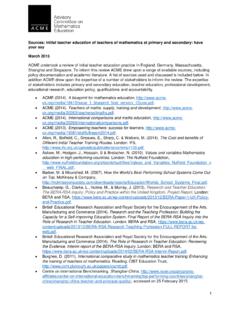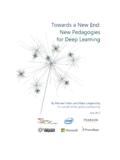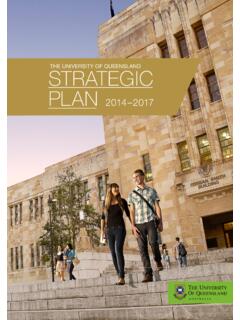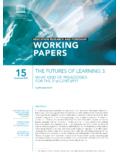Transcription of ACME Position Paper: key issues for the future of …
1 IntroductionGovernment has not seriously questioned the learning and teaching of mathematics in primary schools since the implementation of the National Numeracy Strategy s (NNS) Framework for Teaching Mathematics in schools in 1999. This document is now so well embedded into primary practice that it is impossible in most cases to separate schools own strategic planning for curriculum development for mathematics from the aims and goals of the Primary National Strategy (PNS)1. Seven years on, Government has decided to review the Framework for Teaching Mathematics and associated materials. At this time of review and refl ection, acme would like to take stock of the positive impact that the guidance in the Framework for Teaching Mathematics has had on the quality of learning and teaching of mathematics in primary schools and to consider some wider issues within mathematics education that may affect future school development. This Position paper was prepared following a discussion with a small primary working group which included members of acme , researchers in mathematics education, primary headteachers, a primary teacher and a Local Authority (LA) advisor in mathematics.
2 Other members of the mathematics community were invited to comment on the discussion questions. We hope that the key issues identifi ed below will enable those practitioners refl ecting on the revision of the Framework for Teaching Mathematics to consider its appropriateness within the broader context of primary school areas were considered during the discussion:Curriculum planningPedagogy Subject-related Continuing Professional Development (CPD) acme recognises the signifi cant impact that assessment procedures have on learning and teaching in primary mathematics, but felt this was beyond the scope of this particular project. This Position paper addresses the fi rst two points listed above and will help inform acme s separate primary mathematics CPD study, which will examine how CPD addresses primary teachers subject knowledge of mathematics, teachers knowledge of varieties of pedagogic models, and teachers abilities to plan effectively for mathematics Curriculum Schools and teachers have increasingly relied on the resources written and provided by the PNS since 1999, starting with the Framework for Teaching Mathematics documents and later, in many schools, incorporating Unit Plans.
3 These have been useful, exemplifying the ways in which an objective-led curriculum might be planned, and indeed, helping to provide a planned curriculum for teachers who have required this. :::The Advisory Committee on Mathematics Education ( acme ) is an independent committee, based at the Royal Society and operating under its auspices, which acts as a single voice for the mathematics community on mathematics education issues . It seeks to improve the quality of mathematics education in schools and colleges, and advises Government on issues such as the curriculum, assessment and the supply and training of mathematics teachers. acme Position paper : key issues for the future of primary mathematics learning and teachingMay 2006 acme PR/061 The National Numeracy Strategy came under the umbrella of the Primary National Strategy when the Secretary of State for Education and Skills launched Excellence and Enjoyment A Strategy for Primary Schools in May 2003.
4 As a consequence, many headteachers and primary teachers have passively and uncritically continued to use these resources in their planning and teaching without due consideration of the specifi c needs of the pupils in their own schools. Whilst teachers may feel more confi dent that the topics suggested under the Framework for Teaching Mathematics should be taught, teachers confi dence has been reduced by PNS decisions about both the topics that need to be taught and how these can best be taught. We believe that many teachers are over-reliant on these types of resources. The top-down pressure on pupil test results imposed by Government, LAs, governing bodies and headteachers has left many teachers feeling stripped of their professional responsibility for curriculum planning and has removed the opportunity this provides to work collaboratively with colleagues. This in turn has resulted in some teachers feeling that they are being forced to act against their professional judgement as experienced practitioners, and in addition has left some pupils feeling anxious about mathematics because they lack a solid understanding of the subject.
5 It should, for example, be noted that the Trends in International Mathematics and Science Study (TIMMS) surveys demonstrate that even though pupil attainment increased from 1995 to 2003, pupils attitudes became signifi cantly less :Headteachers need to encourage and support teachers in actively identifying appropriate curriculum planning for their The current Framework for Teaching Mathematics provides extensive detail of the topics that are expected to be taught, despite the successive slimming down of the National Curriculum Orders. There is a danger that planning is now driven by the need to cover Framework for Teaching Mathematics topics, rather than the need to enable teachers to plan for appropriate progression or to recognise progression in individual pupils learning. In addition, much of the guidance in the Framework for Teaching Mathematics is procedural rather than process-driven or conceptual. Reducing the number of learning outcomes by ensuring that those remaining are conceptual and focus on the development of mathematical thinking will allow teachers to plan a series of lessons that progressively build on and consolidate mathematical :Teachers need to be given the opportunity to plan sequences of lessons where pupils experience a carefully developed progression of mathematical concepts and ideas, so that they develop as mathematical thinkers.
6 Mathematics is taught as a discrete subject in primary schools. Following the introduction of Excellence and Enjoyment (DfES, 2003) schools have been asked to consider ways in which enjoyment and creativity can be built into the learning and teaching of mathematics. Many primary schools are fi nding this diffi cult, and few schools have begun to develop cross-curricular planning to integrate some areas of mathematics into project work . However, where schools have taken these steps, teachers have been able to make useful connections between mathematics and other curriculum areas. In one example, a school took a theme and developed it within each class. Teachers were encouraged to plan retrospectively by identifying learning outcomes that had been achieved. They were then able to fi nd examples from all areas of the mathematics curriculum applied within the project, with the exception of calculations. In other cases, objectives for data-handling are being addressed within the teaching of subjects such as science and :Teachers need more guidance within schools on the ways in which mathematics can be creatively integrated with other areas of the curriculum, without losing the rigour of mathematical Interactive Whiteboards (IWBs) are becoming increasingly available in primary classrooms.
7 Some teachers feel that IWBs have had a positive impact on their planning and on pupils motivation, particularly for boys. However, IWBs are relatively new and their positive impact may reduce over time. There are some concerns that IWBs are teaching tools rather than learning tools, and as such, may often require pupils to engage passively in lessons. It has been suggested that concrete materials and practical work are now rarely observed in Key Stage 2 mathematics lessons, as these have been replaced by pre-prepared pictures on an IWB. Planning for teaching using IWBs is made easier because resources can be retrieved from previous years preparation. A wealth of teacher resources for IWBs is appearing on which teachers can download. There is the potential for IWBs and associated resources to be uncritically adopted, as was the case with Unit :The use of IWBs alone is not likely to improve learning and teaching. Teachers need to be encouraged by their schools to refl ect on the impact that IWBs have on their own pupils learning of mathematics and consider this in relation to the use of other teaching strategies.
8 ::2 A major impact for schools following the implementation of the NNS s guidance was the adoption of a three-part lesson structure. Many teachers still adhere to this structure without refl ecting on its purpose or effects. Ofsted has expressed its concern that there are some cases in which uncritical adherence to the three-part lesson structure has a less than positive impact on learning. We wish to support this view. Indeed, the impact of this structure on learning can be less than positive even where schools believe they are doing an adequate job, eg where good Key Stage test scores are achieved. Teachers should constantly question their practice and understand the principles that underpin their own teaching approaches. There are many different models and structures on which to base mathematics lessons, and teachers need to consider how different aspects of mathematics might be taught in certain ways, for example by extended problem solving over more than one lesson.
9 A wider discussion of mathematics pedagogy needs to be developed both during initial teacher education and between experienced teachers of primary mathematics so that they can justify pedagogically their choice of teaching approach, both generically and in specifi c lessons. Some of the guidance in the current Framework for Teaching Mathematics was based on models seen in other countries, but insuffi cient time was devoted to gaining understanding of the underlying pedagogies. Mathematics pedagogy continues to be developed and researched across the world as well as in the UK. For example, more is known about developing mathematical thinking from rich contexts as seen in the Realistic Mathematics Education developments in primary schools in the Netherlands, and from investigative situations as seen in current work in the United States. Policy makers and providers of CPD need to keep up-to-date with the latest developments in mathematics teaching both at home and abroad, and consider whether these have the potential to impact positively on learning and teaching in our :Mathematics pedagogy should be more widely discussed during teacher training and service and should be better related to end purpose.
10 It should be informed by national and international educational The current Framework for Teaching Mathematics has shifted the teacher s role to more direct whole-class teaching, stimulated by Ofsted, which reports that this :has helped raise standards in the teaching of primary mathematics. As a consequence, there is often very little pair or group work in some classes. Whilst some PNS consultants have encouraged teachers to use talk partners , we are concerned that in many cases there is still insuffi cient opportunity for pupils to discuss the mathematics they are learning, either with the teacher or with other pupils. Similarly, too few tasks that are set for pupils allow for their interaction. We feel that at present many primary teachers do not develop mathematical talk well in their classrooms, possibly because they feel restricted to whole-class discussion. One teaching model that has attempted to address this issue is the Cognitive Acceleration in Mathematics in Education (CAME) project, in its recent primary extensions.









